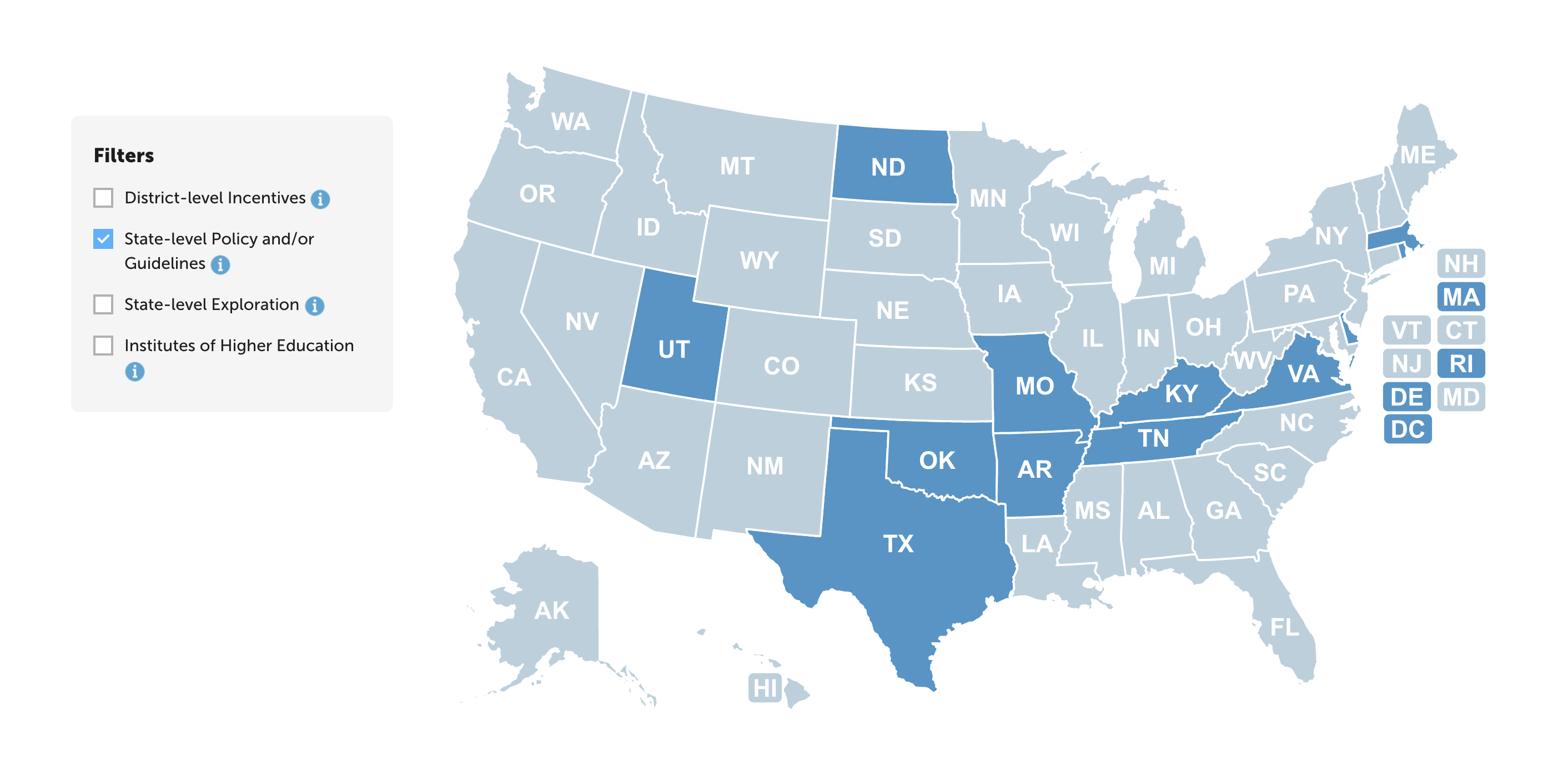In the past decade, micro-credentials have influenced the
credential ecosystem and shifted the landscape of recognizing knowledge and skills. Digital Promise launched its
Micro-credential Policy Map in January 2020 to inform how school districts, higher education institutions, and states throughout the United States are engaging with micro-credentials. Updates to the Micro-credential Policy Map are done on a yearly basis.
To capture the growth of micro-credentials in the credential ecosystem, the following filter is used:
- District-Level Incentives: Individual schools and/or districts have policies recognizing micro-credentials earned by educators.
- State-Level Policy and/or Guidelines: Policies supporting micro-credentials are in place at a state-wide level through legislation or the state’s department of education. States without policies feature district implementation examples instead.
- State-Level Exploration: The state or the state’s department of education has endorsed the use of micro-credentials or has facilitated a relationship between a third-party organization offering credentialing and other institutions (e.g., higher education) within the state. This may include piloting micro-credentials; creating a committee to evaluate the use; partnering with an organization to develop or distribute micro-credentials; or having a formal discussion on the functionality of it.
- Institutes of Higher Education: Micro-credentials have a presence in higher education as part of the curriculum or are available to educators for credit.

District-level
Since last year’s update, there has been an increase in district-level initiatives and both states and higher education institutions implementing micro-credentials. During this scan of the micro-credential policy map, we identified eight new district-level initiatives that are exploring micro-credentials for teacher professional development or K-12 students.
- Alaska is offering its first micro-credential via the National Education Association, Improving Teaching Practices through Competency-based Personalized Learning.
- In Colorado, Cherry Creek Schools has a Micro-credential Program for high school gifted and talented students.
- In Snellville, Georgia, the city’s Digital Badge Program has partnered with area schools to offer the program to elementary, middle, and high school students.
- In Maryland, Anne Arundel County Public Schools offers educator micro-credentials.
- Michigan CoOp offers its network of school districts personalized professional development through micro-credentials.
- In Ohio, the University Heights City School District offers its ninth and 10th graders, as well as parents, micro-credentials that recognize practical skills. Also, the Educational Service Center of Central Ohio offers educators the Specialized Behavior Technician micro-credential.
- In Tennessee, STEM School Chattanooga awards digital fabrication micro-credentials to its high school students.
- In West Virginia, Jefferson County Schools offers micro-credentials to its educators.
State-level
While reviewing state-level micro-credential policies, we found that eight new state-level policies or guidelines explore micro-credentials, from accepting micro-credentials for educator licensure or re-licensure, to awarding micro-credentials, to recognizing skills, and to awarding high school students.
- Alabama accepts micro-credentials from educators with a Non-Professional Temporary Certificate who are pursuing the Professional Educator Certificate.
- IdahoSTARS offers early childhood development-related badges to early childhood educators. Also, Idaho SkillStack® offers industry-relevant digital badges to validate educators’ demonstrated skills.
- The Illinois State Board of Education offers technology-related micro-credentials to its educators. Additionally, the Latino Policy Forum has partnered with the DuPage Regional Office of Education to offer the English Learner Administrator Academies as micro-credentials.
- The Indiana Department of Education has partnered with All4Ed and BloomBoard to offer micro-credentials to high school students who demonstrate mastery of career-readiness skills needed for postsecondary success.
- The Louisiana Department of Education accepts micro-credentials for their Pre-Educator Pathway.
- The Nevada Department of Education accepts re-licensure of K-12 staff via micro-credentials.
- The New Hampshire Education Department provides the opportunity for educators to earn micro-credentials focused on the science of reading.
- The New Mexico Public Education Department offers micro-credentials as a licensure advancement option for its educators.
During this scan of the micro-credential policy map, one new state-level exploration was conducted by New Jersey. New Jersey’s Report on K-12 Climate Change Education Needs recommends the creation of a micro-credentialing system to ensure teachers receive acknowledgment for the completion of school district professional learning opportunities.
Higher education-level
While reviewing higher education micro-credential initiatives, 13 new higher education institutions’ exploration of micro-credentials were identified, ranging from micro-credentials being offered through general education courses to micro-credentials for current students and workforce, and education-related micro-credentials.
- In Arizona, higher education institutions have begun to offer micro-credentials, such as Northern Arizona University’s Foundations in Effective Teaching Micro-credential.
- The University of Connecticut’s Center for Excellence in Teaching and Learning offers micro-credentials to show mastery after completing Massive Open Online Courses (MOOCS).
- In Florida, all public postsecondary institutions are required to award students a digital badge upon the completion of general education core courses.
- Mississippi State’s Office of the Provost and the Center for Teaching and Learning’s Maroon Academy for Teaching Excellence offers micro-credentials in course design and assessment, active learning, inclusive teaching, and supporting student learning.
- The University of Nebraska offers micro-credentials for students and graduates in the workforce.
- North Dakota State University’s Office of Teaching and Learning offers education-related badges.
- Ohio’s Miami University offers for-credit and non-credit micro-credentials in business, communication and culture, computing and technology, engineering, and personal and professional development. Moreover, Kent State University in Ohio offers micro-credentials in educational live streaming, K-12 computer science, K-12 teaching and learning with games, and soft skills for the workplace.
- The University of Oregon offers a graduate micro-credential in child behavioral health.
- The Center for Holistic Education offers a workshop-based pathway to Southern Oregon University’s School of Education Social Emotional Learning Micro-Credential.
- The University of Rhode Island offers community, equity, and diversity-related micro-credentials.
- The Vermont State University offers industry-relevant micro-credentials for every degree path.
- The University of Washington’s Professional and Continuing Education offers micro-credentials for those in e-learning, K-12 and higher education, human resources, and training and development.
As more districts, states, and higher education institutions continue to adopt micro-credentials and digital badging to recognize skills earned, the Micro-credential Policy Map will continue to be updated periodically to reflect those changes.
Explore the updated Micro-credential Policy Map today and let us know what other stories of micro-credential engagement are taking place in your community!
